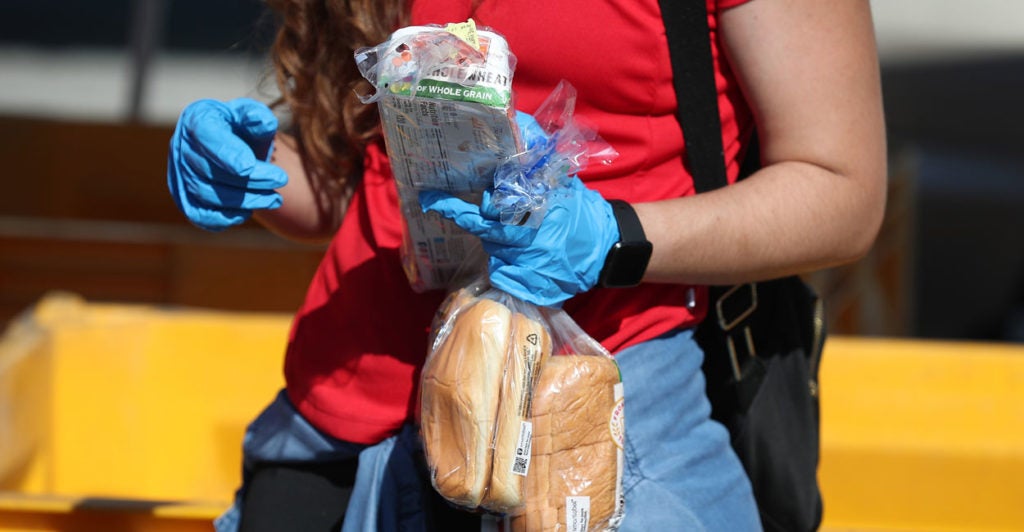The spirit of resilience, leadership, and community is woven into the fabric of American society, and it’s often displayed when we’re going through, or responding to, a national tragedy. It’s been no different with respect to addressing the COVID-19 pandemic.
COVID-19, the disease caused by the new coronavirus, has brought many new challenges to our country. The highly contagious virus is a threat to many lives, but has also threatened our livelihoods.
Businesses have been forced to close their doors and are fighting to keep their employees paid, let alone have any kind of income or savings left for themselves. Schools also have closed their doors, so while some are adjusting to working from home, many parents are simultaneously adjusting to homeschooling their children.
>> When can America reopen? The National Coronavirus Recovery Commission, a project of The Heritage Foundation, is gathering America’s top thinkers together to figure that out. Learn more here.
Millions of people each week are losing their jobs, churches aren’t allowed to open for worship, sporting events have been canceled, and parks are closed.
But in the midst of all this uncertainty, stress, and disruption, Americans have rallied together to fight for their communities and the future health of the nation.
Heritage Action for America has seen this unfold firsthand through our Sentinel community.
Heritage Action Sentinels are a grassroots army of committed conservative activists that holds the line against the liberal agenda by keeping Congress accountable. They come from all walks of life and are leaders in their communities, particularly during this pandemic.
For the past few weeks, Sentinels around the country have shared how they are helping during the pandemic. Their initiatives include being policy ambassadors for their communities, donating to those in need, encouraging first responders, and other actions that show the ingenuity and resourcefulness of Americans.
A father-and-son duo in Georgia, Darrin and Dalton Luedke, have turned their 3D-printing hobby into something more. They’re now making personal protective equipment for those who need it, including hospital workers.
Although the masks are not medical grade, they have been hard to come by and were much-needed for many health care workers. They’re taking donations to help cover their costs, but do not charge for the masks.
A Mississippi restaurant owner, Jenny Nicaud, has donated or raised funds to supply almost 600 meals—each meal enough to feed four people—to local hospital employees, including nurses, doctors, security guards, and maintenance workers. In addition, she has provided meals for local law enforcement and church parishioners in need.
Several Sentinels have hosted food drives or volunteered at their local food pantries to help with the growing demand.
A food pantry in Cheyenne, Wyoming, has seen both its need and its food donations double. And because its usual rotation of volunteers is predominantly elderly and unable to come in due to the health risk, it’s relying on new volunteers, such as Steven Melia.
These volunteers also began doing weekly home deliveries with a special focus on low-income seniors. They now serve 2,300 people a week, and the new delivery program has already given out more than 1,300 bags of food to date.
A Republican group in Peachtree City, Georgia, has started hosting online meetings specifically to pray together. The group meets online every Tuesday at 10:30 a.m. and prays together from 30 minutes to an hour for our country’s leadership and physical, mental, and spiritual health.
They say while they can’t pray together in person, they are “together spiritually and mentally.”
Stories like these are abundant and continue to be shared every day. People are serving in unconventional ways. They’re grocery shopping for those who can’t risk exposure, having community “hangouts” from their driveways, buying gift cards from local businesses to help support them and giving the cards to the needy, and more.
While the conoravirus has been destructive, it also might be the civics refresher our country needs. It’s times like this that remind us how precious our daily freedoms are and where political power lies—and it’s not just in Washington.
Traditional outlets for support and community may be absent for now, but it has not kept Americans from finding new ways to serve our neighbors and feel a sense of community.
No matter the adversity we face, Americans will stand together. We will stand together for our families, for our communities, and for our freedoms.
The more I talk to the grassroots of the nation, the more faith I have in our willingness and ability to help each other during this trial and to rebuild after it. That’s what our country is all about.
